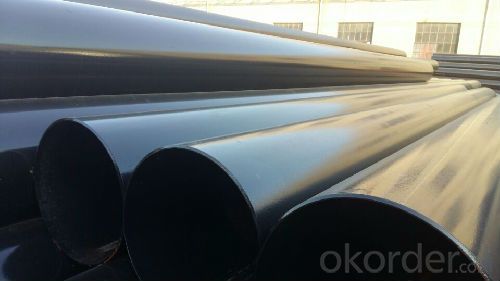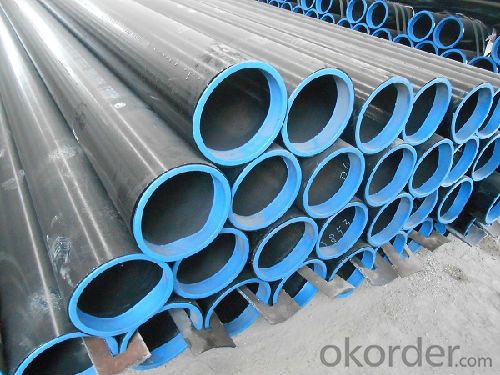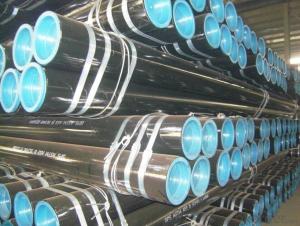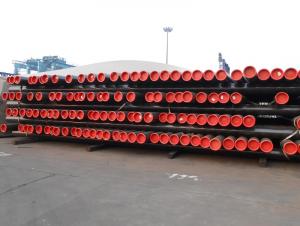All cold and hot rolling seamless steel pipe diameter
- Loading Port:
- Tianjin
- Payment Terms:
- TT or LC
- Min Order Qty:
- 50 m.t.
- Supply Capability:
- 15000 m.t./month
OKorder Service Pledge
OKorder Financial Service
You Might Also Like
1、Structure of All cold and hot rolling seamless steel pipe diameter:
Seamless pipe is formed by drawing a solid billet over a piercing rod to create the hollow shell. As the manufacturing process does not include any welding, seamless pipes are perceived to be stronger and more reliable. Historically seamless pipe was regarded as withstanding pressure better than other types, and was often more easily available than welded pipe.
2、Main Features of All cold and hot rolling seamless steel pipe diameter:
• High manufacturing accuracy
• High strength
• Small inertia resistance
• Strong heat dissipation ability
• Good visual effect
• Reasonable price
3、 All cold and hot rolling seamless steel pipe diameterSpecification:
Standard | GB, DIN, ASTM ASTM A106-2006, ASTM A53-2007 |
Grade | 10#-45#, 16Mn 10#, 20#, 45#, 16Mn |
Thickness | 8 - 33 mm |
Section Shape | Round |
Outer Diameter | 133 - 219 mm |
Place of Origin | Shandong, China (Mainland) |
Secondary Or Not | Non-secondary |
Application | Hydraulic Pipe |
Technique | Cold Drawn |
Certification | API |
Surface Treatment | factory state or painted black |
Special Pipe | API Pipe |
Alloy Or Not | Non-alloy |
Length | 5-12M |
Outer Diameter | 21.3-610mm |
Grade | 20#, 45#, Q345, API J55, API K55, API L80, API N80, API P110, A53B |
Standard | ASME, ASTM |
1) Material:20#(ASTM A 106/A53 GRB.API5LGRB,GB),45#,16Mn,10#.
2) Specification range:OD:21.3-610mm,WT:6-70mm,length:6-12m or according to the requirement of clients.
3) Excutive standards:GB,ASME API5L.ASTM A 106/A53,Despite of the above standards,we can also supply seamless steel pipe with standard of DIN,JIS,and so on,and also develop new products according to the requirements of our clients!
4) Surface:black lacquered,varnish coating or galvanized.
5) Ends:Beveled or square cut,plastic capped,painted.
6) Packing:bundles wrapped with strong steel strip,seaworthy packing.
4、Packaging & Delivery
Packaging Details: | seaworthy package,bundles wrapped with strong steel strip |
Delivery Detail: | 15-30days after received 30%TT |
5、FAQ of All cold and hot rolling seamless steel pipe diameter:
①How is the quality of your products?
Our products are manufactured strictly according to national and internaional standard, and we take a test
on every pipe before delivered out. If you want see our quality certifications and all kinds of testing report, please just ask us for it.
Guaranteed: If products’ quality don’t accord to discription as we give or the promise before you place order, we promise 100% refund.
②How about price?
Yes, we are factory and be able to give you lowest price below market one, and we have a policy that “ for saving time and absolutely honest business attitude, we quote as lowest as possible for any customer, and discount can be given according to quantity”,if you like bargain and factory price is not low enough as you think, just don’t waste your time.Please trust the quotation we would give you, it is professional one.
③Why should you chose us?
Chose happens because of quality, then price, We can give you both.Additionally, we can also offer professional products inquiry, products knowledge train(for agents), smooth goods delivery, exellent customer solution proposals.Our service formula: good quality+good price+good service=customer’s trust
SGS test is available, customer inspection before shipping is welcome, third party inspection is no problem.
6、Seamless Pipe ASTM A106/53 Images:


- Q:Are steel pipes suitable for wastewater pumping stations?
- Yes, steel pipes are suitable for wastewater pumping stations. Steel pipes have excellent strength and durability, making them capable of withstanding the corrosive nature of wastewater and the high pressure involved in pumping. Additionally, steel pipes are resistant to extreme temperatures and can handle the heavy loads commonly associated with wastewater systems.
- Q:Can steel pipes be used for airport construction?
- Yes, steel pipes can be used for airport construction. Steel pipes are commonly used in various construction projects due to their durability, strength, and resistance to corrosion. They are capable of withstanding heavy loads and are often used for underground drainage systems, water supply networks, and structural support in airport construction.
- Q:What are the advantages of using pre-fabricated steel pipes?
- There are several advantages of using pre-fabricated steel pipes. Firstly, they offer superior strength and durability, making them resistant to extreme weather conditions and corrosion, resulting in longer lifespan. Secondly, pre-fabricated steel pipes can be manufactured to precise specifications, ensuring easy installation and reducing construction time and costs. Additionally, they provide excellent structural integrity, which makes them ideal for carrying heavy loads and withstanding high pressure. Lastly, pre-fabricated steel pipes are eco-friendly as they are recyclable, contributing to sustainability and reducing environmental impact.
- Q:What is the minimum wall thickness for steel pipes?
- The minimum wall thickness for steel pipes depends on various factors such as the pipe size, pressure rating, and intended use. However, as a general guideline, the minimum wall thickness for steel pipes is typically determined by industry standards and regulations, and it can range from a few millimeters to several inches. It is important to consult specific codes and standards relevant to the application to accurately determine the required minimum wall thickness for steel pipes.
- Q:How are steel pipes tested for quality assurance?
- Steel pipes are tested for quality assurance through various methods including visual inspection, non-destructive testing (such as ultrasonic testing and magnetic particle inspection), mechanical testing (such as tensile strength and hardness testing), and dimensional checks. These tests help ensure that the pipes meet the required specifications, standards, and safety regulations, ensuring their durability, reliability, and performance in various applications.
- Q:Can steel pipes be used for wastewater systems?
- Yes, steel pipes can be used for wastewater systems. Steel pipes are known for their durability, strength, and resistance to corrosion, which makes them a suitable choice for transporting wastewater.
- Q:What is the role of steel pipes in the food processing industry?
- Steel pipes play a crucial role in the food processing industry by providing a reliable and hygienic means of transporting various fluids, such as water, gases, and food products. These pipes are resistant to corrosion and can withstand high temperatures and pressures, ensuring the safety and efficiency of food processing operations. They are used for conveying ingredients, cleaning agents, steam, and other necessary fluids, maintaining the integrity and quality of food products throughout the manufacturing process.
- Q:Can steel pipes be used for underground water supply networks?
- Yes, steel pipes can be used for underground water supply networks. Steel pipes are commonly used for underground water supply networks due to their durability, strength, and resistance to corrosion. They can withstand high pressure and are able to handle the weight of the soil and other external forces. Additionally, steel pipes are available in various sizes and can be easily welded, making them suitable for different water supply system requirements. However, it is important to take into consideration factors such as the quality of the soil, the presence of chemicals or corrosive substances, and the need for regular maintenance to ensure the longevity and efficiency of the steel pipes in underground water supply networks.
- Q:What is the difference between steel pipes and HDPE pipes?
- Steel pipes and HDPE pipes are both commonly used for various applications, but they differ in their composition and characteristics. Steel pipes are made from a combination of iron and carbon, offering high strength, durability, and resistance to extreme temperatures and pressure. They are commonly used in industries like oil and gas, construction, and plumbing. On the other hand, HDPE pipes are made from high-density polyethylene, a thermoplastic material known for its flexibility, corrosion resistance, and lightweight nature. HDPE pipes are often used in water supply and drainage systems, as well as for underground and aboveground applications. Ultimately, the choice between steel pipes and HDPE pipes depends on the specific requirements of the project, including factors such as cost, application, and environmental conditions.
- Q:What are the different types of threading on steel pipes?
- There are several types of threading commonly used on steel pipes, including tapered or NPT (National Pipe Taper), straight or NPS (National Pipe Straight), and British Standard Pipe (BSP) threading. These different types of threading are designed to ensure a secure and leak-free connection between pipes and fittings.
1. Manufacturer Overview |
|
|---|---|
| Location | |
| Year Established | |
| Annual Output Value | |
| Main Markets | |
| Company Certifications | |
2. Manufacturer Certificates |
|
|---|---|
| a) Certification Name | |
| Range | |
| Reference | |
| Validity Period | |
3. Manufacturer Capability |
|
|---|---|
| a)Trade Capacity | |
| Nearest Port | |
| Export Percentage | |
| No.of Employees in Trade Department | |
| Language Spoken: | |
| b)Factory Information | |
| Factory Size: | |
| No. of Production Lines | |
| Contract Manufacturing | |
| Product Price Range | |
Send your message to us
All cold and hot rolling seamless steel pipe diameter
- Loading Port:
- Tianjin
- Payment Terms:
- TT or LC
- Min Order Qty:
- 50 m.t.
- Supply Capability:
- 15000 m.t./month
OKorder Service Pledge
OKorder Financial Service
Similar products
New products
Hot products
Related keywords





























